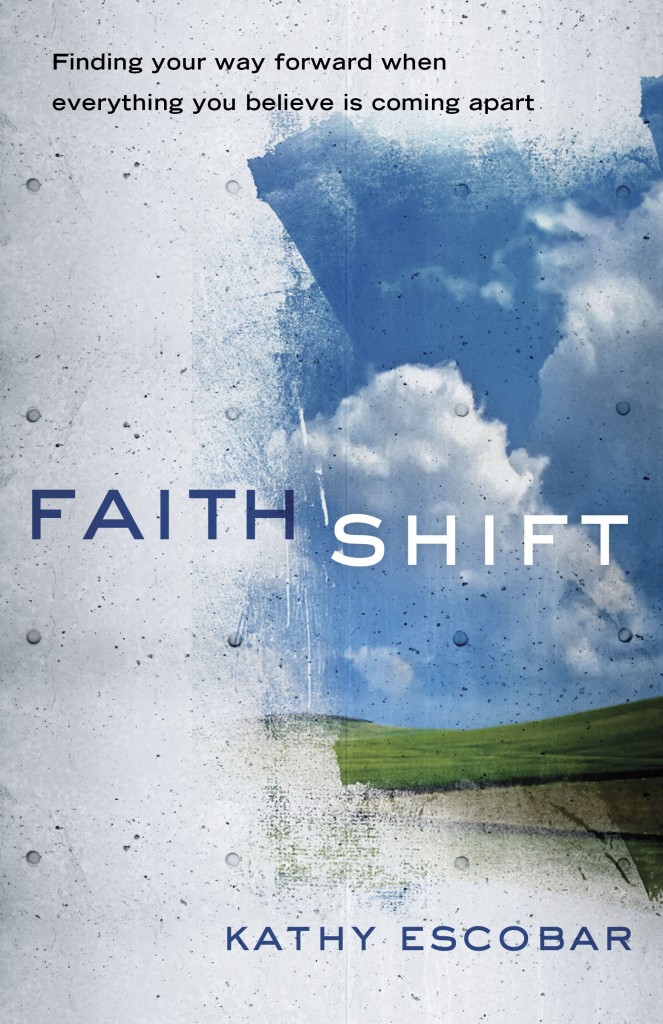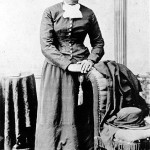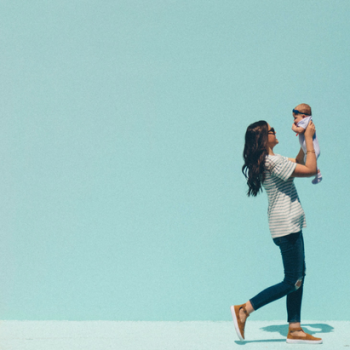
Image: provided by Kathy Escobar
In my Raising Children Unfundamentalist facbeook group, many of us are figuring out how to parent while we are deconstructing or otherwise changing our most foundational Christian values. This is what Kathy Escobar calls Faith Shift, the title of her latest book. Many have been helped by this book so I asked if Kathy would be so kind as to answer some questions my group members had with faith shifting specifically regarding parenting. I love Kathy’s honesty and lack of pretentiousness, as if we were just sharing conversation over coffee. Enjoy the interview!
Q: How do I combat the apparent “need” my extended family & some friends have to inform my children 6,5, & 3 about hell? I don’t know what to say to my children as I personally don’t know if I believe in hell anymore. But I definitely don’t want them terrified.
Oh, that is one of the hardest things, when family members or friends impart certain things onto our children about faith that we don’t have control over. It gets a little easier when they are older because I can ask my kids what was said and we can process it (my kids are all getting older and tend to come home and go ‘Mom, omg, listen to what _____ said…”). But when they are younger, it’s trickier. I’d definitely say if you are present and hear it being said, that it’s totally appropriate to open the conversation with them and set some boundaries on what topics you’d like for them to avoid. Of course, every situation is different and that won’t always work but I think it’s important to remember that when kids are as little at 6, 5, and 3, some of these things can feel really scary!
I remember when my daughter was younger and attended a conservative Christian school and they were doing a whole unit on the rapture. She was terrified to go to sleep at night. I was so angry! We had a great conversation about it because she was probably 10 or 11, but the truth is that no matter how much I tried to reassure her, she was scared inside because they made it all seem so real and “for sure true.”
What is your best practical advice from parenting and ministry experience, given that many of us are parenting while we are deconstructing and faith shifting?
It is so hard to know what to share, what to teach, what to pass on, what to emphasize, what to impart when it comes to faith and our kids when we just aren’t sure anymore. I don’t have any easy answers, but I advise keeping things simple, consider age-appropriateness, and remember that what they “see” is way more important than what they “hear.” Seeing us serve others, advocate for justice, care for the poor, engage with the margins, be honest about our struggles, ask for forgiveness, be kind to strangers, all of those things are ways we are “teaching” them.
A few years ago, when the twins were about 13 we decided to read the entire Children’s Bible that I had from my homeschooling days together each night. It was hard, but good because we didn’t try to pick it apart. They asked questions and I often replied, “I don’t know, there’s no good answer for that” and they appreciated that honesty. In my earlier days I would have tried to explain and exegete for them and I had completely lost that ability. The #1 thing that continues to sustain me is that the best thing I can do for them is to live out my faith and not try to impose it on them. I love that they “get” the justice and mercy part and highly value it without us ever talking about it.
How do I handle my own faith shift in a healthy way when my husband is nowhere on the scale? How do we navigate this with three kids in tow?
This is a really painful and lonely road, when you shift and your spouse isn’t. I’ve got a little section about it in Faith Shift and highlight a few of the main points and see what might resonate. Here are a few highlights from this section—Ways Faith Shifters Can Help Their Non-Shifting Spouses:
* Affirm the relationship. “My relationship with God is changing, but I’m still here.”
* Ask what would help your partner. “In the same way faith shifters need help from the people around them, the spouses who haven’t unraveled could use a little extra love too. It’s appropriate to ask ‘What would help you right now?’ You might not feel comfortable with whatever it is, but your willingness to extend an open hand matters” (p. 205).
* Figure out what you would be willing to do. For some, going to church still is an option. For others, it’s not, but the question is exploring together what is still possible without compromising integrity.
* Decide what is off the table for certain conversations. Some topics are just too painful, and it’s okay to talk through the “let’s just not get into a discussion about that because it will lead to nowhere…”
There’s also a little bit about ways that Non-Shifting Spouses Can Help Faith Shifters. It could be part of the conversation, too. Some of the items that are on there:
* Let go of control
* Be a good listener
* Practice validation
* Hold your own truth – This is so important, on both directions!
* Ask what might help
* Accept the change
These are all fleshed out a little more in the book, but the bottom line is trying to keep the lines of communication open and be willing to make some compromises together, especially when there are kids in the mix.
My most curious question I have is about prayer. Where have you landed currently regarding prayer, and what are your routines like now? How much of your day to day activities depend upon prayer? Do you experience “hearing God” for direction? How do you pray with your children?
One huge change that has helped me is re-framing prayer to mean “when I am thinking about, focusing my attention on, noticing, experiencing.” It has made me realize how much I actually do “pray” during the day but how different it looks.
When I go to sleep at night, I try to do a daily examen, a spiritual practice where we notice God’s presence or absence during the day. I am not a very disciplined person so it is kind of haphazard but I like reflecting back on the day and thinking where I felt peace, where I felt hope, where I felt God’s presence somehow. That’s prayer. I also sometimes still just spend a little time thinking about every person who was in a circle or group or interaction I was in and pray for them in the simplest of ways, it has helped me connect with prayer being ‘my hope for my friends and me, too’.
On the “hearing God” question, it is so different now. I used to get such clear direction and now it feels so much more fuzzy, but I think that sometimes when I’m processing something with people or in my art journal or being quiet on a walk or hike by myself, I get a sense of peace or direction or conviction and I would attribute it to God moving somehow.
With the kids, it’s different because I have 3 adult children. It’s interesting because two of them have completely deconstructed their faith yet if the going gets rough, they will still say “pray for me, okay?” and that always makes me smile. We don’t pray with our 16 year olds intentionally anymore, but we do still say a little prayer before we eat at home sometimes (not always) but I kind of like that, the pause, the moment to be thankful, the we’re-here-together.
Why did you say that you were so glad you faith shifted after spending time with your adult children recently? How old were your children when you began the faith shift and how do you think that has affected them?
The reason I am glad our faith shifted is we transitioned out of a shame-based, performance-centered system into a freedom-based one.
My oldest two got the brunt of it, my #3 got a little less (and is less tainted for sure), and my #4 and 5 have really only grown up in The Refuge and mainly all in public school, and I’ve just seen how they don’t have some of the spiritual baggage that my oldest ones do. We were very controlling in the early years, expected perfection not only of them but also ourselves. A lot of our identity was tied up in their behavior, and we were in fear—“if we don’t teach them ____, then they will not become Christians and that was worst thing in the world.” “If they read Harry Potter, they will be sucked into the demonic.” “If they don’t hide the word in their heart, they won’t have a foundation to stand on.” Oh, so many things that were so fear-based! So that’s what I’m most grateful for—letting go of the fear and trusting them and trusting God.
When I experienced my faith free-fall, my oldest was 13, my daughter was 11, my #3 was 9. The twins were only 6. We waited another couple of years before we pulled them out of school, so they were there up to 15 and 13 and 11. I am not saying all Christian schools are bad; the early years were just fine for us but it is true, as middle school approached, we started hearing things that bothered us but we didn’t think it was as big of a deal as it was. We do wish we would have moved them out sooner. But the reality is, we didn’t, this is their story. They can laugh about a lot of it now and we have made our apologies but I am sad that they spent so much time learning scary, fear-based things about God.












